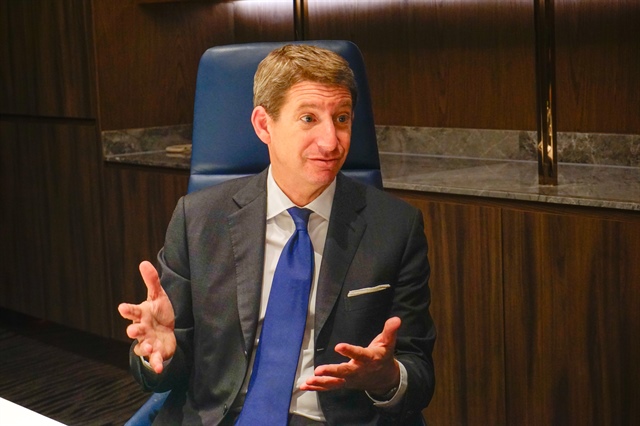|
US finance institution DFC to open representative office in Ho Chi Minh City
The U.S. International Development Finance Corporation (DFC), under the U.S. government, will open its representative office in Ho Chi Minh City to better support the local private sector with its funding and financial tools, DFC CEO Scott Nathan said during an interview with Tuoi Tre (Youth) newspaper on Thursday.

Scott Nathan, CEO of the U.S. International Development Finance Corporation (DFC), in an interview with Tuoi Tre (Youth) newspaper on November 9, 2023. Photo: Nghi Vu / Tuoi Tre
|
This was his second trip to Vietnam in two months, in a firm demonstration of the importance of the country to DFC and the U.S..
In September, Nathan accompanied U.S. President Joe Biden to the Southeast Asian nation to upgrade the Vietnam-U.S. diplomatic ties to comprehensive strategic partnership.
“We've gone through many approvals and are working with the government of Vietnam to make sure that we can get the office opened as soon as possible because there's clearly demand here,” Nathan said.
He added that this is a big development for DFC and the office will definitely make a difference. With its presence in the southern metropolis of Vietnam, DFC’s people can directly do business, make relationships and gather local information.
DFC has identified those in charge of the office.
Besides the representative office opening plan, Nathan also revealed sectors of DFC’s interest in Vietnam.
He said “Over the past years, Vietnam has become our largest market in Southeast Asia, with DFC making commitments across our priority sectors, including energy, agriculture, health, and small business support.”
DFC is looking to foray into other sectors in Vietnam as well, specifically renewable energy, including offshore and inshore wind and solar power projects. The sector is also important to Vietnam’s economic growth and enterprises’ sustainability.
DFC is also interested in high-standard infrastructure projects that are financially sustainable.
The U.S. finance institution is not looking for mega projects that require lending to governments and then burden them with debts or lead to financial instability, Nathan emphasized.
He took an example that DFC had invested over $500 million in a container port in Sri Lanka, adding that the support for the free flows of goods was incredibly important for the development of this country, the region and the global commerce.
Those kinds of infrastructure projects, such as ports, airports, roads and the infrastructure of the 21st century—digital infrastructure, specifically data centers, digital networks, and cellular telephone networks, are those that DFC is interested in.
“It’s important to take the idea of an upgraded relationship and make that concrete with business and economic activities,” Nathan said.
He informed that DFC has a process through which businesses can apply for its funding or financial tools. The first and foremost condition is that they are projects of the private sector.
DFC does not look to offer loans to governments but provides financial support to enterprises in the private sector, Nathan noted, adding that the private sector and small businesses are the engines of the economic growth.
DFC’s priority to help with the economic growth and stability, driven by the private sector.
Moreover, projects should have commercial viability, meaning that they can be financially sustainable. DFC needs enterprises to provide their financial information so that DFC can be able to trust its partners that they are transparent, follow local laws and are not involved in corruption.
DFC also cares much about their environmental sustainability, social responsibility, and labor standards, Nathan told Tuoi Tre.
During his second trip to Vietnam, CEO Nathan met with current and prospective clients, public and private-sector leaders, and beneficiaries of DFC’s work.
In particular, he met with a delegation of visiting companies looking to further invest in the country and stakeholders investing in renewable energy and advancing the Just Energy Transition Partnership, and visited Fulbright University Vietnam, which is using its US$37 million loan from DFC to construct its new campus in Ho Chi Minh City.
He met with representatives of a fund that is lending money to small businesses, particularly women-owned businesses.
Nathan informed that “It's a real priority for President Biden to make sure that women entrepreneurs are supported and have access to financing that makes a big difference for economic growth.”
DFC is the U.S.’s government development finance institution established in 2019. It partners with the private sector to finance solutions to the most critical challenges facing the developing world today.
DFC invest across sectors including energy, healthcare, infrastructure, agriculture, and small business and financial services.
Vietnam is DFC’s largest market in Southeast Asia with $737 million in exposure, including a loan of $300 for Vietnam Prosperity Joint Stock Commercial Bank (VPBank), $100 million for Tien Phong Commercial Joint Stock Bank (TPBank), $200 million for Southeast Asia Commercial Joint Stock Bank SeABank, and $37 million for Fulbright University Vietnam.
The $300 million and $100 million loan commitments for VPBank and TPBank, respectively, were announced during President Biden’s trip to Hanoi in September this year.
Tuoi Tre News
|